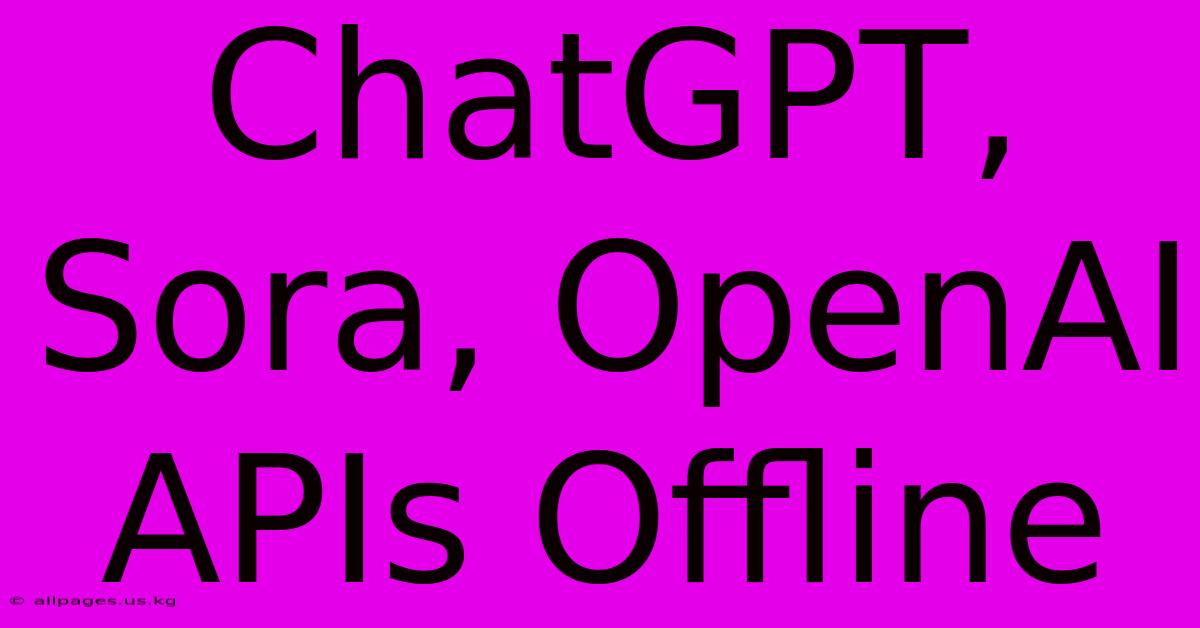ChatGPT, Sora, OpenAI APIs Offline

Discover more detailed and exciting information on our website. Click the link below to start your adventure: Visit Best Website allpages.us.kg. Don't miss out!
Table of Contents
ChatGPT, Sora, and OpenAI APIs: The Offline Revolution?
The world of AI is rapidly evolving, with new breakthroughs emerging seemingly every day. Two recent advancements, OpenAI's Sora video generation and the increasing demand for offline access to its APIs, are reshaping the landscape and sparking conversations about accessibility and the future of AI. This article delves into ChatGPT, Sora, and the push for offline OpenAI APIs, exploring their implications and potential.
Understanding the Power of ChatGPT
ChatGPT, OpenAI's conversational AI, has taken the world by storm. Its ability to generate human-quality text for various tasks, from answering questions to creating creative content, is undeniable. However, its reliance on a constant internet connection is a significant limitation for many users. Offline access would unlock numerous possibilities, particularly in areas with unreliable internet connectivity or situations where an online connection is impossible.
The Need for Offline Capabilities
The need for offline capabilities extends beyond mere convenience. Consider these scenarios:
- Remote areas: Individuals in remote locations with limited or no internet access could benefit tremendously from offline AI assistance.
- Emergency situations: During power outages or other emergencies, offline access to essential AI tools becomes crucial.
- Data privacy: Processing data offline enhances privacy by preventing it from being transmitted over the internet.
- Reduced latency: Offline access eliminates the delay associated with online requests, leading to faster responses.
The demand for offline ChatGPT is a clear indication of the evolving needs of AI users.
Sora: A Leap Forward in AI Video Generation
OpenAI's Sora represents a significant advancement in AI video generation. Its ability to create high-quality, long-form videos from text prompts is groundbreaking. While still in its early stages, Sora's potential is vast, promising to revolutionize filmmaking, animation, and other video-related industries. However, similar to ChatGPT, offline accessibility remains a key factor in unlocking Sora's full potential. Imagine the possibilities of creating videos without relying on a stable internet connection.
Sora and Offline Accessibility: A Future Possibility?
While Sora currently operates online, the possibility of offline versions is certainly a topic for future development. The computational demands of video generation are significant, necessitating powerful hardware. However, as technology advances, the feasibility of running sophisticated AI models like Sora offline will increase. This potential offline access could empower independent creators and democratize access to advanced video production tools.
The Growing Demand for Offline OpenAI APIs
Beyond ChatGPT and Sora, the demand for offline access extends to OpenAI's APIs. Developers rely on these APIs to integrate AI capabilities into their applications. However, the reliance on constant online connectivity presents challenges for developers creating applications for environments with limited or no internet access. Offline OpenAI APIs would open up a wide range of new applications and opportunities.
Challenges and Opportunities
Creating offline versions of OpenAI's APIs presents significant challenges. These include:
- Computational resources: Running complex AI models offline requires substantial computing power.
- Model size: The size of these models necessitates significant storage capacity.
- Security: Protecting the model from unauthorized access and misuse is critical.
However, the potential rewards are equally substantial:
- Enhanced accessibility: Applications can reach users in areas with limited or no internet access.
- Increased privacy: Data processing occurs locally, enhancing user privacy.
- Improved reliability: Applications are less susceptible to internet outages.
Conclusion: The Future is Offline?
ChatGPT, Sora, and OpenAI APIs represent the cutting edge of AI technology. However, the limitation of online-only access hinders their full potential. The growing demand for offline capabilities highlights the need for developers and researchers to explore and overcome the technical challenges involved. The future of AI may well depend on the successful development and implementation of offline AI solutions, empowering users and unlocking unprecedented possibilities. The offline revolution is on the horizon, and the implications are profound.

Thank you for visiting our website wich cover about ChatGPT, Sora, OpenAI APIs Offline. We hope the information provided has been useful to you. Feel free to contact us if you have any questions or need further assistance. See you next time and dont miss to bookmark.
Featured Posts
-
Pitt Vs Toledo 6 Overtime Classic
Dec 27, 2024
-
Wordle Help Today December 27th 2024
Dec 27, 2024
-
Veteran Coach Joins Red Wings
Dec 27, 2024
-
Teddy Bridgewater Joins Detroit Lions
Dec 27, 2024
-
Pittsburgh Falls To Toledo In Six Ots
Dec 27, 2024
